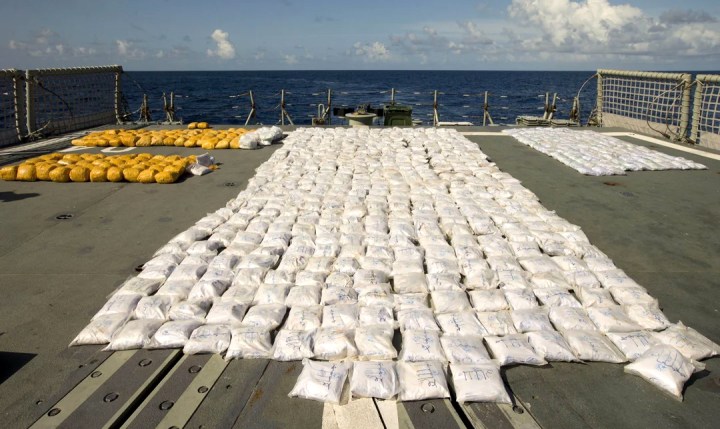ISS TODAY OP-ED
Gambia partnership with EU’s Seacop making waves in disrupting widespread maritime drug trafficking

By teaming up with the EU’s Seaport Cooperation Project, can the country disrupt the rising cocaine trade?
Gambia is a key transit point for South American cocaine being smuggled to Europe. In February, over 800 kg of cocaine that had been transferred from a larger ship in the open sea was confiscated from a Gambian fishing boat in Senegalese waters. In 2021, Gambian authorities seized almost three tonnes of the drug, hidden in a shipment of industrial salt from Ecuador.
Gambia’s government admits the country is being used as “transit/storage for cocaine, heroin and cannabis originating from source countries and the sub-region entering the country through the sea, land, and air borders”.
A police officer with the Drug Law Enforcement Agency (Dleag), who requested anonymity, said the rise in maritime cocaine smuggling in the country could be traced back to the early 2000s. At that time, the opening of global markets saw traffickers start using West Africa as a transit point for cocaine shipments from South America to Europe.
The country’s 200 km coastline and limited resources to effectively police its maritime domain make it an attractive location and practical transit point for cocaine trafficking. Transnational organised criminal groups have also capitalised on the limited law enforcement capacity at the country’s ports.
Under Yahya Jammeh’s rule, the government faced substantial challenges in investigating and prosecuting drug crimes, according to Michael Davies, Executive Director of Public-Private Integrity, an anti-corruption civil society organisation. He told the Enact organised crime project that this primarily stemmed from “inadequate case management, a shortage of staff in the judicial sector and court overload — and the criminals knew that”. The country’s former leaders and institutions have also been implicated in drug trafficking.
In recent years, however, Gambia has been fighting back. Ismaila Sow, a police officer with Dleag, said the current administration was working with regional and international partners to share intelligence, run joint operations, train law enforcement and improve capacity to detect and intercept drug trafficking boats. The country’s 2021 agreement signed with Nigeria indicated its willingness to fight the maritime drug trade, said Sow.
Gambia has also improved its legal framework. The amended National Drug Control Council Act (2005) established the independent National Drug Enforcement Agency to enforce, regulate and coordinate all matters related to illicit drug trafficking and abuse. The act has since been amended four times to enhance its enforcement capabilities. In 2014, the drug enforcement agency was reconstituted as the Dleag to ensure compliance with international standards.
These advances, along with an increased investment in law enforcement agencies, have resulted in more drug seizures, drug-related arrests and prosecutions. QTV reports that from January 2021 to April 2023, the Dleag recorded 1,629 cases involving 1,665 accused. In the same news story on World Drug Day 2023, Minister of Interior Seyaka Sonko expressed the government’s determination to “dismantle any organised crime network in our jurisdiction”.
In January, Gambia signed an agreement with Seacop, the European Union-funded Seaport Cooperation Project that works with countries to disrupt and prevent maritime trafficking. The project’s main implementing partner, Expertise France, aims to build capacity and strengthen cooperation in countries on the trans-Atlantic cocaine route.
Akizi-Egnim Akala, Seacop’s Deputy Regional Coordinator for West Africa, told Enact that the Seacop-Gambia agreement would build on the “good work the current administration is doing to take the fight to the criminals”.
To achieve results, however, Gambia must prioritise improved information sharing, intelligence gathering and joint operations between police, customs and port authorities, as called for by the agreement. A specialised maritime task force dedicated to combatting drug trafficking must be established, comprising members of various security agencies, including the police, navy and customs. The unit will need resources and training to investigate and apprehend traffickers.
Akala said the Seacop project would provide Gambia’s drug enforcement agencies with equipment and training in October. Seacop emphasises intelligence-driven approaches and technology to identify high-risk containers and detect illicit goods. It will provide authorities with advanced container scanning equipment and data analysis tools that should significantly improve Gambia’s ability to identify and intercept contraband.
Combatting maritime drug trafficking also requires a close working relationship with neighbouring countries and regional partners. Gambia shares a long border with Senegal — a major transit point for drug traffickers. Gambia’s maritime security is linked to activities in the Gulf of Guinea, a significant hotspot for piracy and other crimes. Any efforts to combat drug trafficking and other marine crimes must include joint operations and patrols, and the harmonising of legislative frameworks.
Gambia must also get involved in the development and implementation of a regional maritime security strategy, as called for by the Yaoundé Code of Conduct — the backbone of maritime security for West and Central Africa. DM
Feyi Ogunade, ENACT Regional Organised Crime Observatory Coordinator, West Africa, Institute for Security Studies (ISS).
Enact is funded by the European Union and implemented by the Institute for Security Studies in partnership with Iinterpol and the Global Initiative against Transnational Organized Crime.
First published by ISS Today.


















 Become an Insider
Become an Insider
Comments - Please login in order to comment.